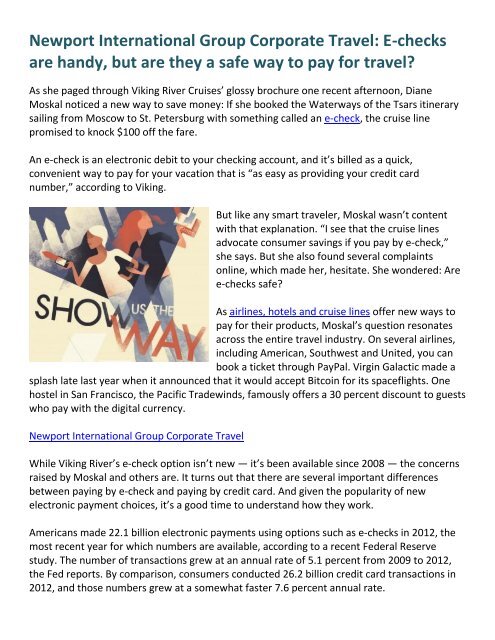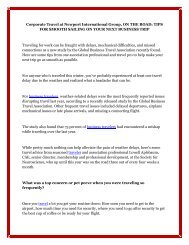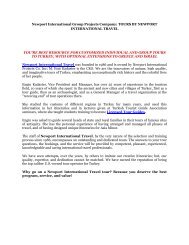Newport International Group Corporate Travel: E-checks are handy, but are they a safe way to pay for travel?
You also want an ePaper? Increase the reach of your titles
YUMPU automatically turns print PDFs into web optimized ePapers that Google loves.
<strong>Newport</strong> <strong>International</strong> <strong>Group</strong> <strong>Corporate</strong> <strong>Travel</strong>: E-<strong>checks</strong><br />
<strong>are</strong> <strong>handy</strong>, <strong>but</strong> <strong>are</strong> <strong>they</strong> a <strong>safe</strong> <strong>way</strong> <strong>to</strong> <strong>pay</strong> <strong>for</strong> <strong>travel</strong>?<br />
As she paged through Viking River Cruises’ glossy brochure one recent afternoon, Diane<br />
Moskal noticed a new <strong>way</strong> <strong>to</strong> save money: If she booked the Water<strong>way</strong>s of the Tsars itinerary<br />
sailing from Moscow <strong>to</strong> St. Petersburg with something called an e-check, the cruise line<br />
promised <strong>to</strong> knock $100 off the f<strong>are</strong>.<br />
An e-check is an electronic debit <strong>to</strong> your checking account, and it’s billed as a quick,<br />
convenient <strong>way</strong> <strong>to</strong> <strong>pay</strong> <strong>for</strong> your vacation that is “as easy as providing your credit card<br />
number,” according <strong>to</strong> Viking.<br />
But like any smart <strong>travel</strong>er, Moskal wasn’t content<br />
with that explanation. “I see that the cruise lines<br />
advocate consumer savings if you <strong>pay</strong> by e-check,”<br />
she says. But she also found several complaints<br />
online, which made her, hesitate. She wondered: Are<br />
e-<strong>checks</strong> <strong>safe</strong>?<br />
As airlines, hotels and cruise lines offer new <strong>way</strong>s <strong>to</strong><br />
<strong>pay</strong> <strong>for</strong> their products, Moskal’s question resonates<br />
across the entire <strong>travel</strong> industry. On several airlines,<br />
including American, Southwest and United, you can<br />
book a ticket through PayPal. Virgin Galactic made a<br />
splash late last year when it announced that it would accept Bitcoin <strong>for</strong> its spaceflights. One<br />
hostel in San Francisco, the Pacific Tradewinds, famously offers a 30 percent discount <strong>to</strong> guests<br />
who <strong>pay</strong> with the digital currency.<br />
<strong>Newport</strong> <strong>International</strong> <strong>Group</strong> <strong>Corporate</strong> <strong>Travel</strong><br />
While Viking River’s e-check option isn’t new — it’s been available since 2008 — the concerns<br />
raised by Moskal and others <strong>are</strong>. It turns out that there <strong>are</strong> several important differences<br />
between <strong>pay</strong>ing by e-check and <strong>pay</strong>ing by credit card. And given the popularity of new<br />
electronic <strong>pay</strong>ment choices, it’s a good time <strong>to</strong> understand how <strong>they</strong> work.<br />
Americans made 22.1 billion electronic <strong>pay</strong>ments using options such as e-<strong>checks</strong> in 2012, the<br />
most recent year <strong>for</strong> which numbers <strong>are</strong> available, according <strong>to</strong> a recent Federal Reserve<br />
study. The number of transactions grew at an annual rate of 5.1 percent from 2009 <strong>to</strong> 2012,<br />
the Fed reports. By comparison, consumers conducted 26.2 billion credit card transactions in<br />
2012, and those numbers grew at a somewhat faster 7.6 percent annual rate.
The benefits <strong>to</strong> companies <strong>are</strong> obvious: They avoid <strong>pay</strong>ing any fees associated with credit<br />
cards and <strong>they</strong> receive the cus<strong>to</strong>mer’s money right a<strong>way</strong>, deposited directly in<strong>to</strong> their<br />
merchant bank. But consumers have an advantage, <strong>to</strong>o, at least according <strong>to</strong> companies like<br />
Viking.<br />
“Guests who <strong>pay</strong> via e-check receive a discount of two percent, which reflects a savings that<br />
Viking passes on <strong>to</strong> the guest by not having <strong>to</strong> <strong>pay</strong> a fee <strong>to</strong> a credit card company,” says Viking<br />
spokesman Ian Jeffries. He says that the company also recommends <strong>pay</strong>ment via e-check as an<br />
alternative <strong>to</strong> a credit card so that you can avoid any interest rates or fees that some credit<br />
card companies may charge.<br />
Viking is hardly alone. One recent study found that a quarter of airlines worldwide offer some<br />
<strong>for</strong>m of alternative electronic <strong>pay</strong>ment option. As companies try <strong>to</strong> escape the high merchant<br />
fees charged by credit cards, these <strong>pay</strong>ment choices <strong>are</strong> bound <strong>to</strong> become more common in<br />
the near future.<br />
“Conventionally, the discounted <strong>pay</strong>-by-e-check transactions <strong>are</strong> processed through the<br />
<strong>travel</strong>er’s bank, given the cus<strong>to</strong>mer’s bank routing numbers and checking or savings account<br />
numbers,” says Oliver McGee, a <strong>for</strong>mer U.S. deputy assistant secretary of transportation <strong>for</strong><br />
technology policy and a professor at Howard University.<br />
E-<strong>checks</strong> come in two basic flavors: Check21 electronic <strong>pay</strong>ment processing, which is more<br />
flexible <strong>but</strong> also more expensive, and the more restricted ACH wire deposit <strong>pay</strong>ments, which<br />
<strong>are</strong> commonly used <strong>for</strong> handling direct deposits <strong>for</strong> employees and <strong>for</strong> <strong>pay</strong>ing bills.<br />
As a practical matter, setting up an e-check involves giving the <strong>travel</strong> company basic bank<br />
in<strong>for</strong>mation, typically gained through the bank’s routing numbers, as well as your account<br />
number, and authorizing the transaction.<br />
But you also sacrifice something when you’re <strong>pay</strong>ing with an e-check. As with paper <strong>checks</strong>,<br />
once the money is deposited in<strong>to</strong> the company’s account, your ability <strong>to</strong> reverse the charges is<br />
limited. Your right <strong>to</strong> dispute an e-check <strong>travel</strong> purchase is governed by the ACH or Check21<br />
terms and conditions as well as the electronic fraud protection conditions of your financial<br />
institution.<br />
By comparison, a credit card purchase is protected by federal law under the Fair Credit Billing<br />
Act, which, among other things, lets you dispute charges <strong>for</strong> products you didn’t accept or that<br />
weren’t delivered as agreed, and which can quickly fix a billing error.<br />
“You have more lee<strong>way</strong> <strong>to</strong> dispute a purchase made with a credit card,” says David Bakke, who<br />
edits the personal finance Web site Money Crashers (www.moneycrashers.com).
If an e-check booking goes wrong — say, <strong>for</strong> example, that your cruise line files <strong>for</strong> bankruptcy<br />
protection and you want a refund — you may lose your money. Bakke says that e-<strong>checks</strong> can<br />
be reversed in only three cases: if you didn’t authorize the purchase, if the e-check was<br />
processed on a date earlier than authorized or if the amount of the processed transaction is<br />
different from what was authorized. Otherwise, the money is as good as gone.<br />
While complaints about e-<strong>checks</strong> <strong>are</strong> r<strong>are</strong>, grievances with companies over wired money<br />
appear <strong>to</strong> be increasingly common. Not a week seems <strong>to</strong> go by that someone doesn’t ask me<br />
<strong>to</strong> help retrieve money that had been wired <strong>to</strong> a company or an individual. These transactions<br />
<strong>are</strong> difficult, if not impossible, <strong>to</strong> undo. Generally, if you’re dealing with a small local company<br />
or an individual, you can kiss the cash goodbye.<br />
After I explained the differences in <strong>pay</strong>ment methods <strong>to</strong> Moskal, she consulted her <strong>travel</strong><br />
agent, who booked her on the Viking riverboat cruise <strong>to</strong> Russia this fall. “She never raised the<br />
question of <strong>pay</strong>ing by anything other than credit card,” says Moskal.




